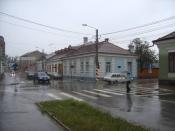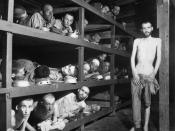Samuel Coleridge's poem, "The Dungeon", is a great piece of literature to display the way that the book Night by Elie Wiesel makes a statement on how people become numbed to various environmental factors when they are surrounded by them on a daily basis, most especially those that are horrendous. In his poem, Coleridge ridicules the then-common method of attempting to "straighten out" members of society by placing them in, as could be clearly guessed from the poem's title, dungeons. Coleridge's words clearly show that he disapproves of the practice, suggesting instead alternative ways that he believes would hasten the desired affect of rehabilitating inmates, methods such as exposing them to the "soft influences" of nature. In Coleridge's firmly placed opinion "... (the inmate's) soul...(is)...hopelessly deformed by sights of ever more deformity!" (first stanza, lines 18-19) This point is nearly identically mirrored by Wiesel's Night.
In the novel, the young Wiesel suffers a life as a Jew oppressed by Germany's Nazis in the beginning and during the course of World War II.
There, he is sent to various concentration camps, where he has to struggle to survive. In the midst of his circumstances, Elie comes to realize just how the camp's atmosphere of violence and death comes to insidiously subvert people who would otherwise be exemplary people into godless animals that are quite willing to use any methods at their disposal to survive. This preoccupation with survival leads to people doing hideously cruel things to other inmates. Near the end of the book, after the Jews of Buna are evacuated and arrive at a new concentration camp, Elie's father falls ill and spends his whole time in bed. There, the other prisoners steal his bread, harass him, and "...keep hitting (him)..." because he has become too ill to leave...


